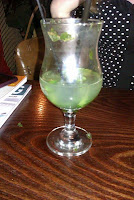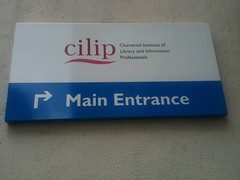This post primarily focuses on Twitter, inspired in part by a number of conversations I've had lately. I’ve only been using it for about a year (I joined as part of Thing 4 last year) but I thought I would share my experience of using it so far, which may be helpful to people getting started.
Like a lot of people I had a perception of Twitter, as something mainly used by celebrities and people tweeting about what they had for breakfast, so I wasn't that interested in it.
But really I couldn’t have been more wrong, as was pointed out in a recent event we held on Social Media “Twitter is what you make of it”. I tend to use it for work, 90% of the people or organisations I follow are in the museum or library sector. Most of those people tend to tweet a mixture of personal and professional (the ‘profersonal’ approach). They share links to blogs and articles, recommend tools and resources, report from conferences and discuss issues in the profession.
There is a bit of personal thrown in there too, so they come across as real humans rather than crazed, workaholic robots, but primarily I use Twitter as an information resource, and to create and strengthen links with others in the library sector.
Whenever I talk to people about using Twitter there seem to be three main questions/problems that arise; “how do you know who to follow”; “I’m not sure I have anything to say”; and “how do you fit it all in/keep on top of it?”.
So here's how I tackled those areas.
Who to follow;
It can be difficult to know who to follow, thankfully you can usually check out a person's profile first, looking at their tweets can help you decide (plus you can always ‘unfollow’ if you change your mind!).As I joined as part of CPD23, I of course followed @CPD23 and some of the contributors such as @Girlinthe or @Annie_Bob
I also followed organisations and institutions like @CILIPinfo (plus the CILIP sub groups @CILIPRareBooks and @CILIPCIG); @AmgueddfaCymru; @NLWales; @HVCats; @LISNPN; @LibraryCamp and of course @CLICLibraries!
There were a number of ‘uberlibrarians’ I thought worth following, as you can count on them to draw your attention to useful blogs and online tools. People such as @Philbradley; @theREALwikiman (author of the Library Marketing Toolkit); @librarianbyday (responsible for the Library Day in the Life project) and @bethanar (author of the LIS New Professionals Toolkit), they are of course many more, but I can't list everyone!
I also created a network of local librarians; including the CILIP Wales officer @Minimorticia, and a Cardiff list featuring @Darklecat; @helbader; @Ceridwen339; @Gemma_DS; @alisonharvey_; @MathomHouser; @glambuslib; @glamlaflib to name but a few!
Also look out for #ff (Follow Fridays) when people tweet their 'follow' recommendations.
What to tweet
I had no idea what to say for my first tweets and 'lurked' for a while, until I had the courage to say something. Another option is to start by retweeting things that are of interest to you.Alternatively you could take part in a scheduled conversation, such as @uklibchat (Tuesdays 6.30-8.30pm GMT). The agenda is always on their blog in advance, giving you a chance to see the questions and start composing your replies. All replies need to contain the hashtag #uklibchat, meaning they can be grouped together and afterwards a summary of the discussions is posted. It’s a really great way to start taking part in conversations on Twitter, without the pressure of trying to compose tweets off the top of your head.
Or there are the chartership chats for people doing (or thinking of doing) chartership, or those already chartered who would like to give advice and support to others. Chartership chats happen on Twitter on Thursdays and are organised by Jo Alcock (@joeyanne) using the #chartership hashtag.
How to avoid becoming overwhelmed with tweets
This can be a tricky one. I'm lucky that I can access Twitter on my phone, as it means I can check it when I'm waiting for the bus or while I'm watching TV. I often save hashtags as columns, allowing me to see any tweets containing that hashtag, which can be very helpful if you are following a conference.You can also divide up the people you follow in to lists, and just view what people from a particular list are tweeting. That way if you are a bit pressed for time you can pick and choose what type of tweets you want to look at that day, for example I might choose only to look at tweets from my list of CLIC librarians one day, and tweets from people about their #cpd23 progress the next.
Another good tip is to save things and come back to them. If tweets contain links to interesting blog posts or online articles, but I don't have time to read them immediately, I'll often bookmark them on my phone. Jen Gallagher (@medievaljenga) recommends using Pocket, and Evernote is another handy alternative, and you can log in to your account on any PC to view what you've saved.
I think the main thing though is not to worry to much about it. It's impossible to catch everything, and if something is really important/useful it will be retweeted so much that you'll catch it eventually. A lot of people archive tweets, or use Storify, meaning even if you're not aware of the conversation initially, you can still catch what was said at a later date.
Wow this post contains a lot of hyper links!
















